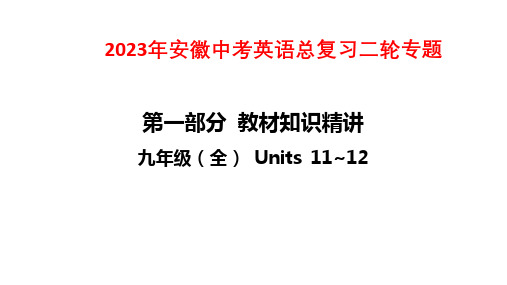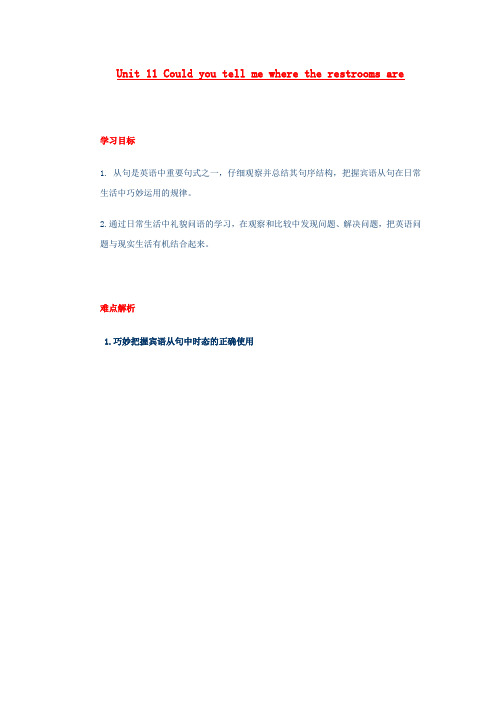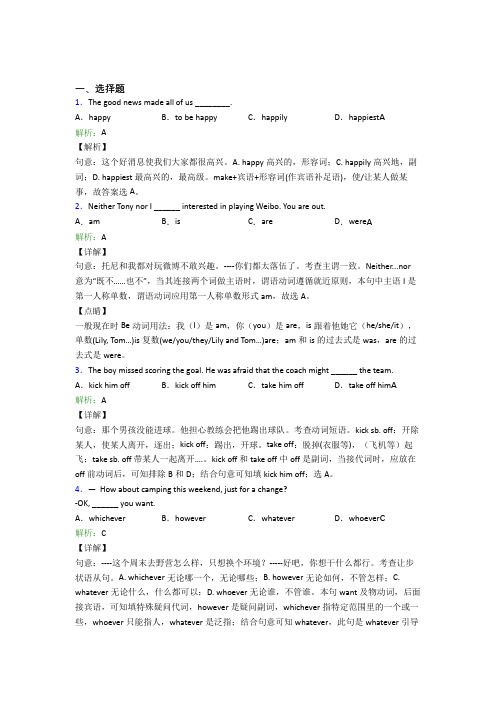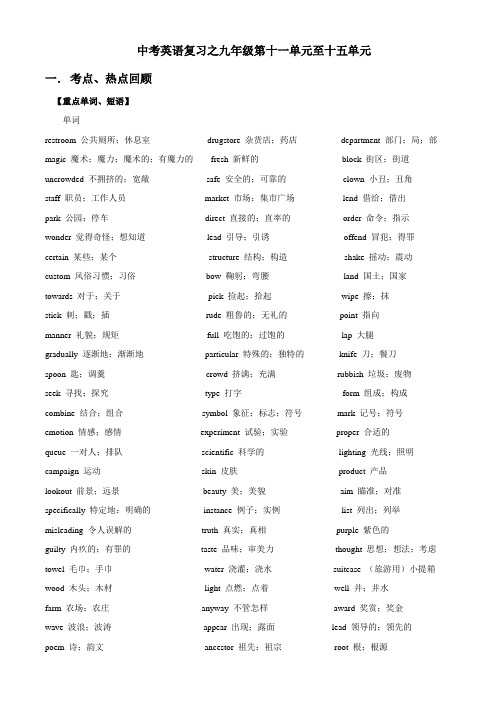九年级英语专题复习十一
2022年中考英语考点复习 九年级(全) Units 11~12(教材知识梳理课件)(人教版)

② By the time I got back to school, the bell had rung. ③ As I was waiting in line with the other office workers, I heard a loud sound. ⑤What happened to Dave on April Fool’s Day?
12. unexpected, backpack, oversleep, block, worker, stare, disbelief, above, burn, burning, alive, airport, till, west, cream, workday, bean, market,fool, costume, embarrassed, announce, spaghetti, hoax, discovery, lady, cancel, officer, believable, disappear, embarrassing
回归教材
3. Neither medicine nor rest can help him. (教材P83 3a)
Point neither … nor … 既不……也不……
neither … nor … 表示否定含义,用来连接两个并列的主语、谓语、宾
语或表语等。当连接两个并列的主语时,谓语动词要与邻近的主语在人
回归教材
九年级英语Unit11-Unit15复习教案 人教新目标版

九年级英语Unit11-Unit15复习教案The First PeriodⅠ. Teaching Aims and Demands1. Knowledge ObjectsKey vocabulary that students have learned in Units 11~15.2. Ability ObjectsTrain students’ ability to use the target language they have learned freely and creatively.3. Moral ObjectRepetition is the mother of learning.Ⅱ. Teaching Key PointKey vocabularyⅢ. Teaching difficult PointTrain students’ ability to use the target language they have learned freely and creatively.Ⅳ. Teaching MethodPractice methodⅤ. Teaching AidThe blackboardⅥ. Teaching ProceduresStep I RevisionCheck homework. Ask five students to read their sentences one by one using the words in activity 1 in preceding class.Help correct the mistakes made in their sentences.Step Ⅱ 1aThis activity reviews some of the vocabulary that students have learned in Go For It Book 5.In this activity, we’ll reviens some of the vocabulary in Units 1~15 by completing a crossword. Now, look at the clues with the headingsDown and Across.Draw students’ attention to the crossword. Read the sample answer to the class: I can look out of the window in my apartment. Make sure that they understand what they need to do. Then say,Please read the clues and complete the crossword. Get students to do the crossword in pairs. While they are working, move around the classroom to make sure that allthe students know what to do, offering help if necessary.Cheek the answers by asking different students to read out and spell the answers.AnswersDown 1. windows 2. bought 3. is 5. elephant 6. wrong 7. suitcase 8. award 12. made 15. scarf 16. jobs 18. rude 19. meet 20. orAcross 1. walls 4. noodles 7. strong 8. are 9. on 10. trash 11. sit 13. had 14. done 17. customer 21. ever 22. fast 23. cheetahStep Ⅲ 1bThis activity requires students to creatively use the language they have learned.Go through the instructions with the class. Invite a pair of students to read the sample conversation.S A: This is a place where we can go to see animals.S B: Is it a zoo?S A: Yes, it is.Make sure students understand what they need to do. Ask students to choose four words from Units 11~15 and write a clue for each word. Have students do the activity in pairs. When they work, move around the classroom listening and offering help where necessary.Ask four students to say their clues and have the class guess the words.S1: It is useful and helpful to us and can bring us success in competition.(advantage)S2: This is a person who owns something.(owner)S3: This is a metal container in which food is kept cold.(refrigerator)S4: This is a large sea animal. We also call it sea cow.(manatee)Step Ⅳ SummaryIn this class, we’ve reviewed some of the vocabulary words in Units 1~15.Step Ⅴ HomeworkReview the vocabulary words in Units 11~15Step Ⅵ Blackboard DesignReview of units 11~15The Second PeriodⅠ. Teaching Aims and Demands1. Knowledge Objects(1) Listening practice using the target language.(2) Oral practice using the target language.2. Ability Objects(1) Train students’ listening skill.(2) Train students’ speaking skill.3. Moral ObjectIf you review what you have learned actively, you will make greater progress.Ⅱ. Teaching Key Points1. Listening practice using the target language.2. Oral practice using the target language.Ⅲ. Teaching Difficult PointTrain students’ listening skill.Ⅳ. Teaching Methods1. Listening method to improve students’ listening ability.2. Pairwork to make every student work in class.Ⅴ. Teaching AidA tape recorderⅥ. Teaching ProceduresStep Ⅰ RevisionDictate some vocabulary words in Units 11~15.guidebook, member, advantage, manatee, environment, greet, bow, wipe, serve, miss, fresh, rude, endangered, useful, strong, tiny, politely, mostly, gradually, speciallyChoose five words. Encourage students to make sentences with them.S1: Everyone has more advantages than disadvantages.S2: Manatees are large sea animals.S3: Let’s go out for some fresh air.S4: He was late for school because he missed the bus.S5: The ant is a tiny insect.Step Ⅱ 2aThis activity provides practice in listening for the general idea.focus attention on the four pictures.Say, You are going to listen to four conversations. Match the conversations with the correct pictures. Point to the sample answer. Say, This picture matches the first conversation you will hear.Play the recording for the first time.Students only listen.Play the recording a second time.This time students listen and match the conversations with the correct pictures by writing the numbers in the boxes.Check the answers.Answers(from top to bottom)1,4,2,3TapescriptConversation 1Cbu: Tom, I have some questions about your country, Canada.Tom: Okay. What do you want to know?Cbu: What are you supposed to do when you meet someone for the first time? Tom: You’re supposed to shake hands.Cbu: How about time? For example, when a party is at eight o’clock, do you go at eight o’clock?Torn: No, you can go about fifteen minutes late.Cbu: OK. Is it the same for business meetings?Tom: Oh no. For a business meeting make sure you’re on time.Cbu: Mm. I heard that it’s rude to make sounds when you eat. Is that true? Tom: Yes. it is. You shouldn’t do it.Cbu: One more question. Are you supposed to take a gift when you visit someone? Tom: Yes, it’s polite to take a few flowers.Cbu: Thanks. Now I’m ready.Conversation 2Ben: Excuse me, could you tell me where the doctor’s office is?Sue: Yes, it’s on the second floor, beside the escalator.Ben: Mm. First I need to buy a book. Is there a book store around here? Sue: Sure. You can find Biblo Books on the fourth floor. Take the elevator.Ben: Oh, I also need to exchange some money.Sue: Yes. There’s a bank on the first floor. It’s right behind you.Ben: Good. I think that’s everything. Oh no. There’s one more place I need to go.Sue: Yes?Ben: Do you know where I can buy some shampoo?Sue: Yes, there’s a drugstore on the third floor. Take the elevator.Ben: Thank you. You’ve been very helpful.Sue: You’re welcome.Conversation 3Mom: We have to leave in half an hour. Is everything ready for the trip?Xiao Li: I don’t know.Mom: Well, have you packed the travel guidebook?Xiao Li: Yes. I did. Oh! But I forgot the map.Mom: OK. Pack the map. What about the camera?Xiao Li: Yes. I have the camera.Mom: What’s that noise? Have you turned off your radio?Xiao Li: No, I’ll do it now.Mom: And the towels. Have you packed the towels yet?Xiao Li: Yes. I packed the towels.Mom: What about the food? Did you pack the food?Xiao Li: Yes. I’ve packed it already.Morn: Well, I think we’ve almost ready!Conversation 4Henry: Hi, Janet. Would you like to help save the environment?Janet: I don’t know. What can I do?Henry: Well, first, you can start by turning off the lights.Janet: Yes. That’s easy. Sometimes I turn on the lights without thinking.What’s next?Henry: Second, you can ride a bicycle.Don’t take a bus or a taxi if you don’t have to.Janet: That will save money, too. What else?Henry: Thrid, try to recycle paper.Janet: Mm. Newspapers, magazines, mail …we get a lot of paper at home. Good idea.Henry: The fourth idea is turning off the shower When you’re not using it.Janet: You mean, when I have shampoo in my hair?Henry: Yes. Get wet. Turning off the shower. Put in the shampoo in your hair and then turn on the shower and wash it out.Janet: Will that help the environment?Henry: Yes. We have to save water. And fifth, take a bag when you go shopping. Don’t use plastic bags.Janet: OK. My parents do most of the shopping. I’ll tell them.Step Ⅲ 2bThis activity requires students to listen for specific information in the dialogues.Look at the four different questions types next to the pictures in Activity 2a. Give students two minutes to go through the list of questions. You are going to listen to the same recording again. This time you need to listen for specific information in the dialogues that will help you answer the questions. Point out the sample answers.Play the recording for students to answer the questions. Play the recording a second time or a third time if necessary.Have students do the activity in pairs.When they work, walk around the classroom listing and offering help where necessary.Ask several students to share their answers.AnswersFTFFT53214doctor’s office--second floor;bookstore--fourth floor;bank--first floor; drugstore--third floor√pack the guidebook; × pack the map;√pack the camera;× Turn off the radio;√pack the towels;√pack the foodStep Ⅳ 2cThis activity lets students work in pairs to practise the conversations they have just heard.Go through the instructions with the class, sample conversation in the box. Invite a pair of students to read it to the class.S A: Would you like to help save the environment?S B: I don’t know. What can I do?Write the sample conversation on the blackboard.Now work with a partner. Start by reading the sample conversation in the box with your partner. Then make conversations using information in Activity 2a.Get students to practise their conversations. As they work, walk around the classroom offering help and encouragement.Ask several pairs of students to say their conversations to the class.For example:S A: Would you like to help save the environment?S B: I don’t know. What can I do?S A: You can turn off the shower while you are washing your hair.S B: When I have shampoo in my hair?S A: Yes.Step Ⅴ SummaryIn this class, we’ve done a lot of listening and oral practice Using the target language.Step Ⅵ HomeworkAsk students to write three conversations in Activity 2c in their exercise books.Step Ⅶ Blackboard DesignReview of Units 11~15The Third PeriodⅠ. Teaching Aims and Demands1. Knowledge ObjectsOral practice using the structures Supposed to, It makes me…and Present perfect with already and yet.2. Ability Objects(1) Train students’ speaking skill.(2) Train students’ writing skill.3. Moral ObjectExpress your own opinions freely and correctly.Ⅱ. Teaching Key Points1. Supposed to2. It makes me…3. Present perfect with already and yet.Ⅲ. Teaching Difficult PointTrain students’ speaking and writing skills.Ⅳ. Teaching Methods1. Practice method2. PairworkⅤ. Teaching AidThe blackboardⅥ. Teaching ProceduresStep I RevisionCheck homework. Invite several students to say their conversations to the class.Check any errors and correct them.Step Ⅱ Part 3This activity provides writing and speaking practice using the target language.Go through the instructions with the class. Look at the sample conversation in the box. Invite a pair of students to read it aloud to the class.A: What are you supposed to do when you meet a new person in the USA?B: You’re supposed to shake hands.A: In China, you’re supposed to…Write the conversation on the blackboard.Look at the list of questions. Get a student to read the questions to the class.Please write your answers to these questions. Ask students to finish the task on their own.The answers may vary. For example:A: What are supposed to do when you meet someone in China?B: You are supposed to bow to the person/say Hi to the person/shake hands with the person.Ask students to fill in their answers, then discuss with a partner. While they are working, move around the classroom listening to different pairs and offering help as needed.Ask several pairs to share their activities.Step Ⅲ Part 4This activity lets students work in pairs to practice writing and speaking skills.Go through the instructions with the class.Look at the sample conversation in the box.Invite a pair of students to read it aloud to the class as a model.S A: How do you feel when you see the national flag of China?S B: It makes me feel proud. How about you?S A: It makes me proud, too. I think of famous Chinese men and women.Write the conversation on the blackboard.Review the different feelings in different situations students have learned.(happy, angry, sleepy, sad, relaxed, tense, etc)Ask students to give their feelings for each of the five items. Say, Please work in pairs.Make conversations to talk about your feelings in different situations. For each item, students should think of a reason for their answer. As they work, move around the classroom listening and offering help as needed.Ask several pairs of students to say their conversations to the class. Answers will vary.Step Ⅳ Part 5This activity provides practice to train students’ writing and speaking skills.Look at the instructions. Let a student to read it aloud to the class. Read the sample answer history project to the class.Say, Please make a list of the things you plan to do this month. Ask students to complete the task individually.Point to the sample conversation in the box. Invite a pair of students to read it to the class.S A: I have to do my history project this week.S B: Really? I’ve already done my history project.Write the conversation on the blackboard.Get students to think of things they need to do today. Ask them to say whether or not they have already done each thing.Ask students to write a list of five things to do this month.Please compare your list with your partner’s. Discuss what you have or have not already done.Ask several pairs to share their discussions with the class. Answers will vary.Step Ⅴ SummaryIn this class, we’ve reviewed the structures Supposed to, It makes me…and Presentperfect with already and yet by writing and oral practice.Step Ⅵ HomeworkAsk students to write two sentences for each structure in their exercise books.Step Ⅶ Blackboard DesignReview of Units 11~15The Fourth PeriodⅠ. Teaching Aims and Demands1. Knowledge Objects(1) Practise talking about hobbies.(2) Practise asking for information politely.(3) Practise using I think/believe/feel that…and I agree/disagree with you.2. Ability Objects(1)Train students’ speaking ability.(2)Train students’ writing ability.3. Moral ObjectsPractice makes perfect.Ⅱ. Teaching Key Points1. Talk about hobbies.2. Ask for information politely.3. I think/believe/feel that…and I agree/disagree with you.Ⅲ. Teaching Difficult PointsTrain students’ speaking and writing skills.Ⅳ. Teaching methods1. Pairwork2. Practice methodⅤ. Teaching AidThe blackboardⅥ. Teaching ProceduresStep Ⅰ RevisionCheck homework.Ask students to exchange their homework exercise with a partner. Help correct each other’s mistakes. Then get different students to say their sentences to the class.S1: We’re supposed to do our homework on time.S2: Pop music makes me happy.S3: Have you cleaned your room yet?S4: Yes. I have already cleaned my room.Step Ⅱ Part 6This activity provides writing and oral practice using the target language. Go through the instructions with the class.Look at the sample conversation in the box. Invite a pair of students to read it to the class.S A: What kind of museums do you like?S B: I like history museums. They’re interesting.S A: Really? I prefer science museums.Write the conversation on the blackboard.Draw students’ attention to the chart.Ask students to read the questions.Please write down your own answers in the first column in the chart. Get students to complete the task individually. Then ask students to interview two classmates about what they like and write their answers in the second and the third columns in the chart.Get students to complete the task in groups if three. As the groups work together, walk around the classroom to make sure all the students know how to fill in the blanks and offer language support as needed.Get different students to report their results like this:S A: What kind of sports do you like?S B: I like football. It is very exciting.S A: Really? I prefer basketball.Answers will vary.Step Ⅲ Part 7This activity lets students work in pairs to practise writing and speaking skills.Go through the instructions with the class.Look at the sample conversation in the box.Invite a pair of students to read it to the class.S A: Excuse me. Can you help me?S B: Yes, certainly. How can I help you?S A: Can you tell me if there are any good museums in the city?S B: There are many good museums. Do you like art?S A: Yes. I like it very much.Write the conversation on the blackboard.Ask a few students about museums, food, transportation and costs. Then write questions using the four sentences as guides.Please make conversations using the questions. Then ask students to role play conversations with their partners using their questions.Have some students share their answers as dialogues with the class.A sample conversation:S A: Excuse me. Can you help me?S B: Yes, certainly. How can I help you?S A: Could you tell me where I can get some good food?S B: There are a lot of good restaurants.What kind of food do you like?S A: Vegetarian.S B: You can try Green Restaurant. They have delicious salads.Step Ⅳ Part 8This activity provides writing and oral practice using the target language. Read the instructions aloud to the class. Point to the sample conversation in the box. Invite a pair of students to read it to the class.S A: I think that cats are the most important animal in China because many people have them as pets.S B: I disagree. I feel that pandas are the most important animal because there aren’tvery many of them.S A: Yes, but cats are more popular with ordinary people.Write the conversation on the blackboard.Ask students to select an animal and write five reasons why it is the most important animal in China. Let them use the words in the box to discuss their opinions in conversations. As they work, walk around the classroom, checking the progress of the pairs and offering language support as needed.Get several pairs of students to say their conversations to the class. Answers will vary.Step Ⅴ SummaryIn this class, we’ve practised talking about hobbies and asking for information politely using the target language.We’ve also reviewed the structures I think/believe/feel that…and I agree/disagree with you.Step Ⅵ Homework1. Read the conversations in Activities 6, 7 and 8 again for a further understanding of the target language.2. Finish off the exercises on pages 65~68 of the workbook.Step Ⅶ Blackboard Design。
2023年安徽中考英语总复习二轮专题课件:九年级(全) Units 11~12

1.The students in our school are made ___ school uniforms on Mondays.
A.wear B.wore C.to wear D.wearing
2.My aunt has tried her best to make her daughter an excellent ___.
A.run out B.leave out C.find out D.work out
√
√
5.—More and more shared bikes are missing these days, sir!—Thanks for telling me. It’s our duty to take action immediately, or more shared bikes will ___.
went off
traight
irport
ill
nexpectedly
rove
lock
locked
oaches
oaching
续表
核心词句过关练
十年真题
1.(2017年93题)Look! The boys are k________(踢) the ball around in the yard.
icking
2.(2014年99题)I’m afraid we have to c_______(取消) the meeting.
A.consider B.warn C.disappear D.collect
6.—I like the weather in Kunming. It’s warm all year around.—Yes, and the temperature stays ___ zero all the time.
(人教版)中考英语总复习夯实基础:九年级 Units 11~12(83页)

温馨提示: (1)would rather...than.../would...rather than...也可以 颠倒为:rather than...would...。wouldrather和 than 后都 接不带 to 的动词不定式,若选用的动词相同,那么 than 后的动词可以省略。 He would rather drink wine than beer. 他喜欢喝葡萄酒而不喜欢喝啤酒。 Rather than work in such bad condition, he would give up. 与其在这样差的条件下工作,他宁愿放弃。
类别 重 点 句 型 整 理
新课标要求 4.When I got to school, I realized that I had left my backpack at home. 当我到 达学校时,我才意识到我把书包忘在家 里了。 5.By the time I got back to school, the bell had rung. 当我返回学校时,铃已经 响了。
(4)“would rather+从句”是一个常用的虚拟语 气句型,谓语一般用过去时来表示现在或将来,意为 “宁愿„„,还是„„好些;一个人宁愿另一个人做某 事”。引导从句的 that 常省略。在谈到过去的动作时, 谓语动词则用过去完成时。 John wants to see me today. I would rather he came tomorrow than today. 约翰今天想来看我。我宁愿他明天
When I came in, he had finished his homework. 当我进来时,他已完成作业了。 By the time I got there, the train had left. 当我到那儿时,火车已离开了。
九年级英语Unit11复习资料 Could you tell me教案

Unit 11 Could you tell me where the restrooms are学习目标1. 从句是英语中重要句式之一,仔细观察并总结其句序结构,把握宾语从句在日常生活中巧妙运用的规律。
2.通过日常生活中礼貌问语的学习,在观察和比较中发现问题、解决问题,把英语问题与现实生活有机结合起来。
难点解析1.巧妙把握宾语从句中时态的正确使用例如(1)“The moon goes around the earth.” Miss Gao told us.(二合一)Miss Gao told us the moon _______ _______ the earth.答案为:goes around.月亮绕地球转是一个客观事实,故从句时态用一般现在时,不受主句时态的影响。
(2) “I have been to Beijing twice.” He said to us.(二合一)He _________ us ______ ______ ______ ________ Beijing twice.答案为:told; he had been to.此题从句就要变成相对应的过去时形式。
2. whether 与if用法区别(1) Let me know _________ he will come or not.(2) She asked me __________ I know whose pen it was.(3) I’m interested in ________ SARS is so terrible.(4) He hasn’t decided ________ to visit the old man.答案:(1)、(3)(4)只有whether; (2)两者均可。
典型例题1. Could you tell me how I can get to the drugstore (变为简单句)Could you tell me how _______ _______ to the drugstore解析:疑问词引导的宾语从句可以转化为疑问+不定式的简单句形式。
Unit 11【过真题】-2022-2023学年九年级英语全一册单元复习过过过(人教版)(解析版)

Unit11 Sad movies make me cry.评卷人得分一、单项选择—River dolphins (豚) that we haven’t seen for years appear in the Yangtze River.—I think it’s the _________ of 10-year fishing ban(禁令). It really works.A.result B.relief C.regret D.resolution【答案】A【详解】句意:——长江中出现了多年未见的江豚。
——我认为这是10年禁渔期的结果。
它真的有效。
考查名词辨析。
result结果;relief救济;regret遗憾;resolution决心。
根据“River dolphins (豚) that we haven’t seen for years appear in the Yangtze River.”可知,长江中出现了多年未见的江豚,是因为10年禁渔期的结果。
故选A。
2.(2022·辽宁抚顺·中考真题)We need to ________ because teamwork is very important. A.run out B.go off C.pull together D.pass by【答案】C【详解】句意:我们需要齐心协力,因为团队合作非常重要。
考查动词短语。
run out用完,耗尽;go off(爆炸装置)爆炸;pull together齐心协力,团结起来;pass by路过。
根据“teamwork is very important”可知,团队合作很重要,所以要齐心协力。
故选C。
of _______.A.achievement B.agreementC.development D.entertainment【答案】D【详解】句意:听音乐和看电影都是放松的娱乐方式。
(必考题)初中英语九年级全册Unit 11复习题(含答案解析)

一、选择题1.The good news made all of us ________.A.happy B.to be happy C.happily D.happiest A解析:A【解析】句意:这个好消息使我们大家都很高兴。
A. happy高兴的,形容词;C. happily高兴地,副词;D. happiest最高兴的,最高级。
make+宾语+形容词(作宾语补足语),使/让某人做某事,故答案选A。
2.Neither Tony nor I ______ interested in playing Weibo. You are out.A.am B.is C.are D.were A解析:A【详解】句意:托尼和我都对玩微博不敢兴趣。
----你们都太落伍了。
考查主谓一致。
Neither...nor意为“既不……也不”,当其连接两个词做主语时,谓语动词遵循就近原则,本句中主语I是第一人称单数,谓语动词应用第一人称单数形式am,故选A。
【点睛】一般现在时Be动词用法:我(I)是am,你(you)是are,is跟着他她它(he/she/it),单数(Lily, Tom…)is复数(w e/you/they/Lily and Tom…)are;am和is的过去式是was,are的过去式是were。
3.The boy missed scoring the goal. He was afraid that the coach might ______ the team. A.kick him off B.kick off him C.take him off D.take off him A解析:A【详解】句意:那个男孩没能进球。
他担心教练会把他踢出球队。
考查动词短语。
kick sb. off:开除某人,使某人离开,逐出;kick off:踢出,开球。
take off:脱掉(衣服等),(飞机等)起飞;take sb. off 带某人一起离开….。
中考英语复习之九年级第十一单元至十五单元

中考英语复习之九年级第十一单元至十五单元一.考点、热点回顾【重点单词、短语】单词restroom 公共厕所;休息室drugstore 杂货店;药店department 部门;局;部magic 魔术;魔力;魔术的;有魔力的fresh 新鲜的block 街区;街道uncrowded 不拥挤的;宽敞safe 安全的;可靠的clown 小丑;丑角staff 职员;工作人员market 市场;集市广场lend 借给;借出park 公园;停车direct 直接的;直率的order 命令;指示wonder 觉得奇怪;想知道lead 引导;引诱offend 冒犯;得罪certain 某些;某个structure 结构;构造shake 摇动;震动custom 风俗习惯;习俗bow 鞠躬;弯腰land 国土;国家towards 对于;关于pick 捡起;拾起wipe 擦;抹stick 刺;戳;插rude 粗鲁的;无礼的point 指向manner 礼貌;规矩full 吃饱的;过饱的lap 大腿gradually 逐渐地;渐渐地particular 特殊的;独特的knife 刀;餐刀spoon 匙;调羹crowd 挤满;充满rubbish 垃圾;废物seek 寻找;探究type 打字form 组成;构成combine 结合;组合symbol 象征;标志;符号mark 记号;符号emotion 情感;感情experiment 试验;实验proper 合适的queue 一对人;排队scientific 科学的lighting 光线;照明campaign 运动skin 皮肤product 产品lookout 前景;远景beauty 美;美貌aim 瞄准;对准specifically 特定地;明确的instance 例子;实例list 列出;列举misleading 令人误解的truth 真实;真相purple 紫色的guilty 内疚的;有罪的taste 品味;审美力thought 思想;想法;考虑towel 毛巾;手巾water 浇灌;浇水suitcase (旅游用)小提箱wood 木头;木材light 点燃;点着well 井;井水farm 农场;农庄anyway 不管怎样award 奖赏;奖金wave 波浪;波涛appear 出现;露面lead 领导的;领先的poem 诗;韵文ancestor 祖先;祖宗root 根;根源overseas 海外的;国外的government 政府strongly 坚定的;坚决的purpose 目的;意图step 步;脚步;步骤enormous 巨大的;庞大的playful 顽皮的aggressive 侵犯的;挑衅的habitat 生长环境underwater 在水下的weigh 称;称…重量discover 发现;发觉polluted 被污染的suitable 适合的;适宜的tiny 极小的;微小的disgusted 厌恶的;憎恶的expression 词语;表达方式recycle 再循环;回收利用pull 拉;拖;拔roof 屋顶;房顶;顶society 社团;社会president 总统;总裁inspiration 灵感spare 多余的;空闲的material 材料;物质business 商业;生意proud 自豪的;骄傲的短语与….不同…依靠,依顺,取决于打扮(成)上交为了有点儿,有几分挨着,紧靠着向右拐有点儿,稍微在吃饭以…开始忍不住/禁不住做邀请某人做某事相互做鬼脸握手用某人自己的……. 属于某人自己的独立地本应该做但实际没有做反对不同意某人的意见惊讶,惊奇使某人惊讶的是力劝某人做某事听说,听到收到…来信来自减肥增肥在社会中在某人的业余时间里瞄准,针对把A同B作比较把A比作B 例如赞成与反对有时,偶尔离开,走开在进行中清除,把…打扫干净清理,打扫干净买东西购物过会儿与某人通话好运气马上环顾四周照顾检查看起来像查找幸亏为…感谢【词语辨析】1.decidedecide vi. 决定+to do sth : We all decide to go+that 从句:I decided that I would tell him about it.vt. 决定、下决心.+(带疑问词的)不定式:+ 名词/代词: You can’t decide anything now.decide to do 决定做某事= make a decision to do sth = make up one’s mind to do sth.decide not to do sth. 决定不做某事表示使某人作出决定时,可用不定式充当宾语补足语。
- 1、下载文档前请自行甄别文档内容的完整性,平台不提供额外的编辑、内容补充、找答案等附加服务。
- 2、"仅部分预览"的文档,不可在线预览部分如存在完整性等问题,可反馈申请退款(可完整预览的文档不适用该条件!)。
- 3、如文档侵犯您的权益,请联系客服反馈,我们会尽快为您处理(人工客服工作时间:9:00-18:30)。
初中英语九年级寒假在线课堂专题复习十一(书面表达)一、范文解析假设某中学生英文报开展关于青少年生活状况的征文活动,请你根据下表所提示的要点,以Some teenagers need to change为题,用英语为该报写一篇短文,简述一些青少年生活状况并提出建议。
学习饮食学业繁重;考前担忧(或自拟内容)零食不断;拒绝果蔬(或自拟内容)现状出行其它无视交规;乱丢垃圾(或自拟内容)(请考生自拟一点内容)建议如何改变现状(请考生各自拟一点内容)注意:1.表达中必须包含所给要点,可以适当发挥,不要简单翻译;2.词数90左右,开头已经写好,不计入总词数;3.表达中请勿提及真实校名及姓名。
Some teenagers need to changeNowadays,some teenagers have plenty of problems in their everyday lives._______________________________________________________________________________ _______________________________________________________________________________ _______________________________________________________________________________ _______________________________________________________________________________ _______________________________________________________________________________ _______________________________________________________________________________ _______________________________________________________________________________ _______________________________________________________________________________ _______________________________________________________________________________二、中考链接A随着互联网的发展,许多中学生开始利用互联网进行学习。
对此,某英文报组织了“合理利用互联网进行学习”的征稿活动,请你根据以下要点写一篇英语文章进行投稿。
互联网用于学习的优势 1.学习资源丰富。
可能导致的问题建议 2.查找资料方便 3. ....1.迷上网络游戏2........注意:1.表达清楚,语句通顺,意思连贯,语法正确2.必须包括表格中所有的要点,并适当发挥3.词数不少于 90 字(文章开头已经给出,不计入总词数)4.不得使用真实姓名和校名Dear editor ,I’ d like to say something about this topic. ________________________________________ _______________________________________________________________________________ _______________________________________________________________________________ _______________________________________________________________________________ _______________________________________________________________________________ _______________________________________________________________________________ _______________________________________________________________________________ _______________________________________________________________________________ _______________________________________________________________________________ _______________________________________________________________________________B假设你叫王华,收到即将升入初三英语笔友徐丽的 email 。
她向你请教如何合理安排暑 假生活,以提高她自己的综合能力来更好地适应初三的学习和生活。
请你根据下列提示用英 语回复徐丽的 email 。
建议 理由 1.锻炼身体 2.旅行观光 3.公益活动 4.自主学习…… …… …… …… 注意:1.不得使用真实的姓名和学校名;2.回信需要包括所有要点,并适当发挥;3.语句通顺,意思连贯,书写整洁;4.词数不少于 90 字(文章开头和结尾已经给出,不计入总词数) Hi Xu Li,How time flies! I’m happy to talk about your coming summer vacation._________________ _______________________________________________________________________________ _______________________________________________________________________________ _______________________________________________________________________________ ______________________________________________________________________________________________________________________________________________________________ _______________________________________________________________________________ _______________________________________________________________________________ _______________________________________________________________________________ _______________________________________________________________________________ I’m looking forward to your reply about your meaningful summer vacation.W ang Hua.C(2016•南通)期中考试后,J ulian所在班级将进行以"学会学习"为主题的英语演讲比赛.假如你是Julian,请根据下表所提示的要点和内容,写一份英文演讲稿.要点内容增强动力(strengthen motivation)明确目标;相信自己;培养兴趣(或自拟内容)优化习惯(mak e habits better)勤于动脑;自主先学;劳逸结合(或自拟内容)讲究方法(pay attention to methods)主动发问;…(请考生自拟两点内容)注意:1.演讲稿中必须包含所给要点,具体内容可以适当发挥,不要简单翻译.2.词数90左右,开头和结尾已经写好,不计入总词数.3.演讲稿中请勿提及真实校名及姓名.Hello,everyone!I'm glad to be here to share my ideas of"Learn how to learn"._______________________________________________________________________________ _______________________________________________________________________________ _______________________________________________________________________________ _______________________________________________________________________________ _______________________________________________________________________________ _______________________________________________________________________________ _______________________________________________________________________________ _______________________________________________________________________________ _______________________________________________________________________________ I hope everyone will enjoy learning.Thanks for listening.D为了满足广大学生对DIY的喜爱,你们学校成立了DIY俱乐部。
